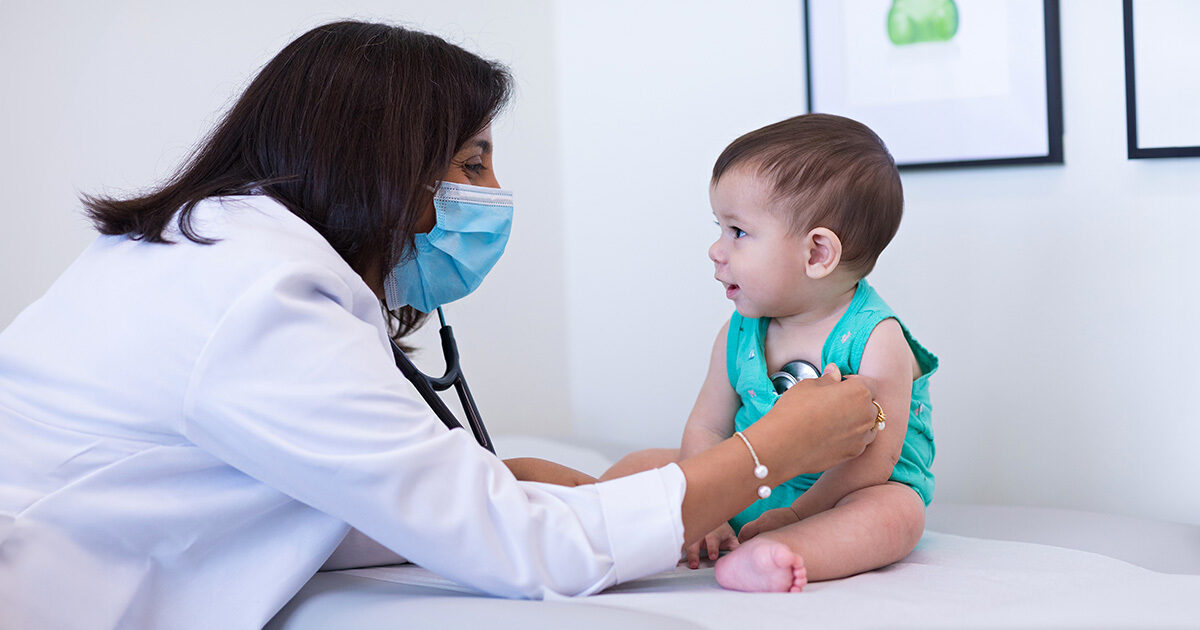Protecting Your Loved Ones From a Measles Outbreak
UT Health Austin pediatrician shares the latest guidelines and recommendations for measles prevention
Reviewed by: Alefiyah Malbari, MD
Written by: Kaylee Fang

For the latest updates on measles outbreaks in Texas and guidance on protecting your loved ones, visit the Texas Department of State Health Services.
Measles is a contagious virus affecting both adults and children. Although the virus has become less common over the years, recent outbreaks due to declining immunization rates in the United States have raised concerns.
“Every few months, there are rapid outbreaks in areas with low immunization rates that encourage the virus to circulate,” shares UT Health Austin pediatrician Alefiyah Malbari, MD, who serves as the Chief of Dell Children’s Medical Group Pediatrics Mueller, a clinical partnership between Dell Children’s Medical Center and UT Health Austin. “Measles is particularly concerning for those without prior exposure to measles antibodies, as they are more susceptible to complications that may lead to hospitalization.”
As of July 11th, a total of 167 measles cases, with 53% of those requiring hospitalization, and 13 outbreaks have been reported in 2024. “While there haven’t been any confirmed cases in Texas this year, it is still important to stay informed,” advises Dr. Malbari.
What are the symptoms of measles?
“Measles is a self-limiting virus, meaning the body can fight it off without much intervention or medication,” explains Dr. Malbari. “However, it is highly contagious and can lead to serious complications, such as pneumonia and encephalitis, which is inflammation of the brain.”
Symptoms of measles typically develop within 14 days after exposure and may include:
- Congestion
- Cough
- Eye discharge
- Fever of 100.4°F or higher
- Inflammation of the eyes
- Loss of appetite
- Runny nose
- Small white spots inside the cheeks
“A widespread rash can appear within 5 days after the first symptoms,” notes Dr. Malbari. “The rash typically begins on the face and spreads downward to the rest of the body. It appears as flat, red spots that may blend together, giving the skin a flushed appearance. Some spots may also appear slightly raised. Patients typically begin to feel better within 48 hours of the rash appearing.”
If your child develops fever, cough, eye symptoms, or a runny nose, especially if they have not been vaccinated against measles, it’s important to contact your pediatrician right away.
Who is most at risk for severe complications from measles?
“Measles can affect people of all ages, though it is most common in children,” says Dr. Malbari.
Individuals are at higher risk for severe illness and complications include:
- Unvaccinated individuals
- Older adults
- Individuals with compromised immune systems
- Pregnant individuals
“Those at highest risk are the unvaccinated,” warns Dr. Malbari. “Pregnant individuals who develop measles may experience complications affecting the fetus in utero, which is why it’s important to consult with your healthcare provider about getting vaccinated before considering pregnancy.”
How is measles diagnosed and what are the treatment options?
“Measles can be confirmed with a blood test that detects the presence of measles antibodies, which your immune system produces when exposed to the virus,” explains Dr. Malbari. “If your test results are positive for IgM antibodies, then you have an active measles infection.”
“While there is no specific treatment for measles, supportive care methods can help ease symptoms,” continues Dr. Malbari. “It’s important to stay in contact with your healthcare provider to monitor the virus’s progression and watch for any signs of complications.”
Supportive care methods that can help ease symptoms include:
- Fever reducers: Over-the-counter medications, such as acetaminophen (e.g., Tylenol) and ibuprofen (e.g., Advil) can help reduce pain and fever. “Read the labels carefully and consult your healthcare provider about the appropriate dose,” recommends Dr. Malbari.
- Vitamins: Children with low levels of vitamin A are more likely to experience severe measles. Clinical research shows that vitamin A may reduce the severity of infection. “Discuss the potential benefits with your healthcare provider to determine the appropriate dosage,” notes Dr. Malbari.
- Hydration and Rest: Drink plenty of fluids to replenish electrolytes, rest adequately, and avoid strenuous activities. “Opt for healthy hydration choices, such as water, diluted juices, and sugar-free electrolytes,” adds Dr. Malbari.
“Measles spreads through respiratory droplets from breathing, coughing, and sneezing, and the virus can remain in the air for several hours and on surfaces for up to two hours,” emphasizes Dr. Malbari. “Consider staying home until all symptoms have cleared up if you or your loved ones are exposed to the virus.”
What steps can be taken to prevent measles?
“The most effective way to prevent measles is by getting the measles, mumps, rubella (MMR) vaccine,” shares Dr. Malbari. “The first dose of the MMR vaccine is recommended at the age of 1 and the second dose is recommended at the age of 4. The two doses are 97% effective at preventing measles.”
“For children who are traveling internationally, consider receiving the vaccine at 6 months of age or older,” continues Dr. Malbari. “While most individuals receive the vaccine during childhood, it remains effective when administered in adulthood.”
Stay up to date on the latest CDC guidance regarding vaccination.
<br>Additional preventative measures include:
- Wash your hands frequently
- Avoid close contact with individuals who are sick
- Avoid sharing food and drinks
- Disinfect toys and commonly shared objects
- Stay home if you or your child feels sick
“Advocate for your health and your loved ones’ health beyond your home,” advises Dr. Malbari. “Understanding the health, safety, and vaccination recommendations in the environments you and your loves ones participate in can help prevent the spread of the virus and measles outbreaks.”
For more information about Dell Children’s Medical Group Pediatrics Mueller or to request an appointment, call 1-512-324-0975 or visit here.